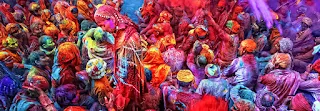Varsha Ritu or Rainy Season
Rainy season marks start of “Visarg Kaal” during which
the air carries moisture. “Adaan Kaal” when the air is dry, weakens the
human body as well as digestive fire. Due to hot sun of summers, rain water,
continuous contact with rain water and hot vapours weakens the digestive fire. This
in turn pollutes the three doshas of the body. Ayurveda suggests following a
plain regime during rainy season.
Things to avoid:
1.
“Sattu Sharbat” or beverage of roasted
gram flour.
2.
Sleeping during day.
3.
Mating
4.
Sun
5.
Work out
Must have things:
1.
Honey water or honey with “Drakshasav”
2.
Sour and salty food with applied clarified
butter (Ghee), particularly on a stormy and colder day.
3.
Wheat, barley, aged rice and wild animal flesh in
form of soup with clarified butter helps preserving digestive fire.
4.
Freshly collected rain water, pond water or
water from well should be used for drinking after boiling and cooling.
5.
Oil massage, bathing and wearing dry light
clothes.
Note: “Vata”, “Pitta” and
“Kapha” are three doshas of body mentioned in ayurveda which in
balanced state keeps the person healthy.
“Vata” is gas/air or air in
your body. If aggravated, it causes joints pain and gas trouble.
“Pitta” is acid and heat in
the body. If aggravated, it causes burning sensation, thirst, over hunger
etc.
“Kapha” is cough or
lubrication which lubricates the body.
<script async src="https://pagead2.googlesyndication.com/pagead/js/adsbygoogle.js?client=ca-pub-7204440794189180"
crossorigin="anonymous"></script>
<ins class="adsbygoogle"
style="display:block; text-align:center;"
data-ad-layout="in-article"
data-ad-format="fluid"
data-ad-client="ca-pub-7204440794189180"
data-ad-slot="7790532513"></ins>
<script>
(adsbygoogle = window.adsbygoogle || []).push({});
</script>















